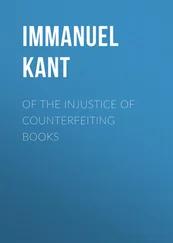All phenomena, then, are continuous quantities, in respect both to intuition and mere perception (sensation, and with it reality). In the former case they are extensive quantities; in the latter, intensive. When the synthesis of the manifold of a phenomenon is interrupted, there results merely an aggregate of several phenomena, and not properly a phenomenon as a quantity, which is not produced by the mere continuation of the productive synthesis of a certain kind, but by the repetition of a synthesis always ceasing. For example, if I call thirteen dollars a sum or quantity of money, I employ the term quite correctly, inasmuch as I understand by thirteen dollars the value of a mark in standard silver, which is, to be sure, a continuous quantity, in which no part is the smallest, but every part might constitute a piece of money, which would contain material for still smaller pieces. If, however, by the words thirteen dollars I understand so many coins (be their value in silver what it may), it would be quite erroneous to use the expression a quantity of dollars; on the contrary, I must call them aggregate, that is, a number of coins. And as in every number we must have unity as the foundation, so a phenomenon taken as unity is a quantity, and as such always a continuous quantity (quantum continuum).
Now, seeing all phenomena, whether considered as extensive or intensive, are continuous quantities, the proposition: “All change (transition of a thing from one state into another) is continuous,” might be proved here easily, and with mathematical evidence, were it not that the causality of a change lies, entirely beyond the bounds of a transcendental philosophy, and presupposes empirical principles. For of the possibility of a cause which changes the condition of things, that is, which determines them to the contrary to a certain given state, the understanding gives us a priori no knowledge; not merely because it has no insight into the possibility of it (for such insight is absent in several a priori cognitions), but because the notion of change concerns only certain determinations of phenomena, which experience alone can acquaint us with, while their cause lies in the unchangeable. But seeing that we have nothing which we could here employ but the pure fundamental conceptions of all possible experience, among which of course nothing empirical can be admitted, we dare not, without injuring the unity of our system, anticipate general physical science, which is built upon certain fundamental experiences.
Nevertheless, we are in no want of proofs of the great influence which the principle above developed exercises in the anticipation of perceptions, and even in supplying the want of them, so far as to shield us against the false conclusions which otherwise we might rashly draw.
If all reality in perception has a degree, between which and negation there is an endless sequence of ever smaller degrees, and if, nevertheless, every sense must have a determinate degree of receptivity for sensations; no perception, and consequently no experience is possible, which can prove, either immediately or mediately, an entire absence of all reality in a phenomenon; in other words, it is impossible ever to draw from experience a proof of the existence of empty space or of empty time. For in the first place, an entire absence of reality in a sensuous intuition cannot of course be an object of perception; secondly, such absence cannot be deduced from the contemplation of any single phenomenon, and the difference of the degrees in its reality; nor ought it ever to be admitted in explanation of any phenomenon. For if even the complete intuition of a determinate space or time is thoroughly real, that is, if no part thereof is empty, yet because every reality has its degree, which, with the extensive quantity of the phenomenon unchanged, can diminish through endless gradations down to nothing (the void), there must be infinitely graduated degrees, with which space or time is filled, and the intensive quantity in different phenomena may be smaller or greater, although the extensive quantity of the intuition remains equal and unaltered.
We shall give an example of this. Almost all natural philosophers, remarking a great difference in the quantity of the matter of different kinds in bodies with the same volume (partly on account of the momentum of gravity or weight, partly on account of the momentum of resistance to other bodies in motion), conclude unanimously that this volume (extensive quantity of the phenomenon) must be void in all bodies, although in different proportion. But who would suspect that these for the most part mathematical and mechanical inquirers into nature should ground this conclusion solely on a metaphysical hypothesis — a sort of hypothesis which they profess to disparage and avoid? Yet this they do, in assuming that the real in space (I must not here call it impenetrability or weight, because these are empirical conceptions) is always identical, and can only be distinguished according to its extensive quantity, that is, multiplicity. Now to this presupposition, for which they can have no ground in experience, and which consequently is merely metaphysical, I oppose a transcendental demonstration, which it is true will not explain the difference in the filling up of spaces, but which nevertheless completely does away with the supposed necessity of the above-mentioned presupposition that we cannot explain the said difference otherwise than by the hypothesis of empty spaces. This demonstration, moreover, has the merit of setting the understanding at liberty to conceive this distinction in a different manner, if the explanation of the fact requires any such hypothesis. For we perceive that although two equal spaces may be completely filled by matters altogether different, so that in neither of them is there left a single point wherein matter is not present, nevertheless, every reality has its degree (of resistance or of weight), which, without diminution of the extensive quantity, can become less and less ad infinitum, before it passes into nothingness and disappears. Thus an expansion which fills a space — for example, caloric, or any other reality in the phenomenal world — can decrease in its degrees to infinity, yet without leaving the smallest part of the space empty; on the contrary, filling it with those lesser degrees as completely as another phenomenon could with greater. My intention here is by no means to maintain that this is really the case with the difference of matters, in regard to their specific gravity; I wish only to prove, from a principle of the pure understanding, that the nature of our perceptions makes such a mode of explanation possible, and that it is erroneous to regard the real in a phenomenon as equal quoad its degree, and different only quoad its aggregation and extensive quantity, and this, too, on the pretended authority of an a priori principle of the understanding.
Nevertheless, this principle of the anticipation of perception must somewhat startle an inquirer whom initiation into transcendental philosophy has rendered cautious. We must naturally entertain some doubt whether or not the understanding can enounce any such synthetical proposition as that respecting the degree of all reality in phenomena, and consequently the possibility of the internal difference of sensation itself — abstraction being made of its empirical quality. Thus it is a question not unworthy of solution: “How the understanding can pronounce synthetically and a priori respecting phenomena, and thus anticipate these, even in that which is peculiarly and merely empirical, that, namely, which concerns sensation itself?”
The quality of sensation is in all cases merely empirical, and cannot be represented a priori (for example, colours, taste, etc.). But the real — that which corresponds to sensation — in opposition to negation = O, only represents something the conception of which in itself contains a being (ein seyn), and signifies nothing but the synthesis in an empirical consciousness. That is to say, the empirical consciousness in the internal sense can be raised from 0 to every higher degree, so that the very same extensive quantity of intuition, an illuminated surface, for example, excites as great a sensation as an aggregate of many other surfaces less illuminated. We can therefore make complete abstraction of the extensive quantity of a phenomenon, and represent to ourselves in the mere sensation in a certain momentum, a synthesis of homogeneous ascension from 0 up to the given empirical consciousness. All sensations therefore as such are given only a posteriori , but this property thereof, namely, that they have a degree, can be known a priori . It is worthy of remark, that in respect to quantities in general, we can cognize a priori only a single quality, namely, continuity; but in respect to all quality (the real in phenomena), we cannot cognize a priori anything more than the intensive quantity thereof, namely, that they have a degree. All else is left to experience.
Читать дальше












